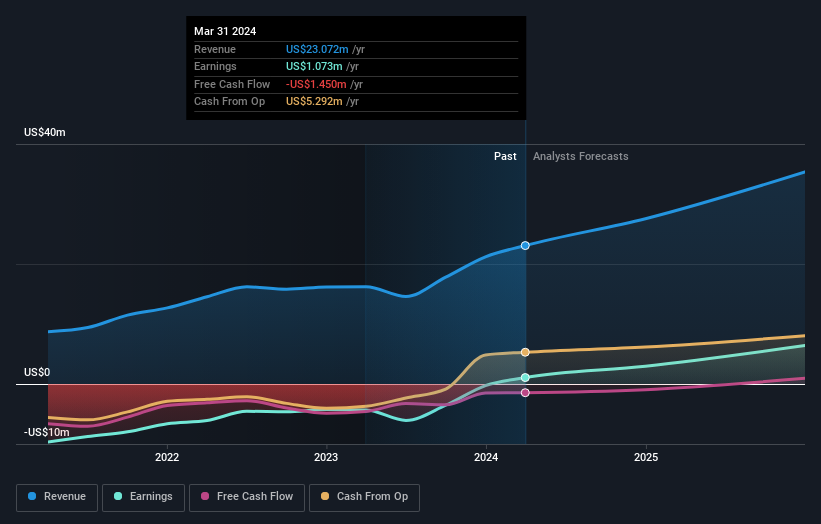Stock Analysis
- United States
- /
- Semiconductors
- /
- NasdaqCM:QUIK
Painful week for retail investors invested in QuickLogic Corporation (NASDAQ:QUIK) after 10% drop, institutions also suffered losses

Key Insights
- The considerable ownership by retail investors in QuickLogic indicates that they collectively have a greater say in management and business strategy
- The top 25 shareholders own 34% of the company
- Insiders have been selling lately
If you want to know who really controls QuickLogic Corporation (NASDAQ:QUIK), then you'll have to look at the makeup of its share registry. The group holding the most number of shares in the company, around 60% to be precise, is retail investors. In other words, the group stands to gain the most (or lose the most) from their investment into the company.
While institutions who own 32% came under pressure after market cap dropped to US$155m last week,retail investors took the most losses.
Let's take a closer look to see what the different types of shareholders can tell us about QuickLogic.
See our latest analysis for QuickLogic

What Does The Institutional Ownership Tell Us About QuickLogic?
Many institutions measure their performance against an index that approximates the local market. So they usually pay more attention to companies that are included in major indices.
We can see that QuickLogic does have institutional investors; and they hold a good portion of the company's stock. This implies the analysts working for those institutions have looked at the stock and they like it. But just like anyone else, they could be wrong. If multiple institutions change their view on a stock at the same time, you could see the share price drop fast. It's therefore worth looking at QuickLogic's earnings history below. Of course, the future is what really matters.

We note that hedge funds don't have a meaningful investment in QuickLogic. The company's largest shareholder is Ben Andrews Revocable Trust, with ownership of 5.3%. In comparison, the second and third largest shareholders hold about 3.6% and 3.1% of the stock. Additionally, the company's CEO Brian Faith directly holds 1.3% of the total shares outstanding.
A deeper look at our ownership data shows that the top 25 shareholders collectively hold less than half of the register, suggesting a large group of small holders where no single shareholder has a majority.
While it makes sense to study institutional ownership data for a company, it also makes sense to study analyst sentiments to know which way the wind is blowing. While there is some analyst coverage, the company is probably not widely covered. So it could gain more attention, down the track.
Insider Ownership Of QuickLogic
The definition of company insiders can be subjective and does vary between jurisdictions. Our data reflects individual insiders, capturing board members at the very least. The company management answer to the board and the latter should represent the interests of shareholders. Notably, sometimes top-level managers are on the board themselves.
I generally consider insider ownership to be a good thing. However, on some occasions it makes it more difficult for other shareholders to hold the board accountable for decisions.
We can see that insiders own shares in QuickLogic Corporation. In their own names, insiders own US$4.8m worth of stock in the US$155m company. It is good to see some investment by insiders, but we usually like to see higher insider holdings. It might be worth checking if those insiders have been buying.
General Public Ownership
The general public -- including retail investors -- own 60% of QuickLogic. This size of ownership gives investors from the general public some collective power. They can and probably do influence decisions on executive compensation, dividend policies and proposed business acquisitions.
Private Company Ownership
It seems that Private Companies own 5.4%, of the QuickLogic stock. It might be worth looking deeper into this. If related parties, such as insiders, have an interest in one of these private companies, that should be disclosed in the annual report. Private companies may also have a strategic interest in the company.
Next Steps:
While it is well worth considering the different groups that own a company, there are other factors that are even more important. For instance, we've identified 3 warning signs for QuickLogic (1 is potentially serious) that you should be aware of.
But ultimately it is the future, not the past, that will determine how well the owners of this business will do. Therefore we think it advisable to take a look at this free report showing whether analysts are predicting a brighter future.
NB: Figures in this article are calculated using data from the last twelve months, which refer to the 12-month period ending on the last date of the month the financial statement is dated. This may not be consistent with full year annual report figures.
Valuation is complex, but we're helping make it simple.
Find out whether QuickLogic is potentially over or undervalued by checking out our comprehensive analysis, which includes fair value estimates, risks and warnings, dividends, insider transactions and financial health.
View the Free AnalysisHave feedback on this article? Concerned about the content? Get in touch with us directly. Alternatively, email editorial-team (at) simplywallst.com.
This article by Simply Wall St is general in nature. We provide commentary based on historical data and analyst forecasts only using an unbiased methodology and our articles are not intended to be financial advice. It does not constitute a recommendation to buy or sell any stock, and does not take account of your objectives, or your financial situation. We aim to bring you long-term focused analysis driven by fundamental data. Note that our analysis may not factor in the latest price-sensitive company announcements or qualitative material. Simply Wall St has no position in any stocks mentioned.
Valuation is complex, but we're helping make it simple.
Find out whether QuickLogic is potentially over or undervalued by checking out our comprehensive analysis, which includes fair value estimates, risks and warnings, dividends, insider transactions and financial health.
View the Free AnalysisHave feedback on this article? Concerned about the content? Get in touch with us directly. Alternatively, email editorial-team@simplywallst.com
About NasdaqCM:QUIK
QuickLogic
Operates as a fabless semiconductor company in the United States.
Flawless balance sheet with high growth potential.

